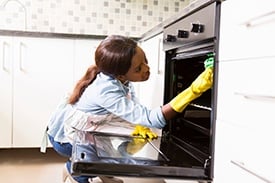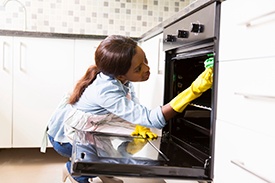Explore Springs Apartments


This article originally appeared on the Springs "You're Home Blog."
Even people who enjoy housekeeping (and yes, they do exist!) cringe at the thought of cleaning the oven. It's a time-consuming, nasty job, and no one else will ever appreciate your hard work.
We would rather see you have more time to lounge alongside our crystal-clear pool or play a lively game of fetch with your pet at our dog park. Here's a handy guide to making oven cleaning (mostly) hassle-free.
Do I Really HAVE To?
After all, no one will ever see the inside of your oven but you, right? The truth is that a clean oven is more than just a matter of appearance.
Can Oven Cleaning Be Eco-Friendly?
Not only can it be, it should be. Commercial oven cleaners are some of the most chemical-laden products you'll find on store shelves, and the odor lingers long after the job is done. You should be particularly concerned with using safe products if you have kids or pets in your household.
Natural Cleaners You and Your Oven Will Love
Have some stainless-steel pads or a pumice stone on hand to tackle those extra-tough build-ups. Also, even though these solutions are natural, always wear rubber gloves when applying them to prevent skin irritation.
Don't Forget the Follow-Up
Once your stove is sparkling clean, keep grime to a minimum by wiping it down with a vinegar-soaked sponge or cloth once a week. You can also prevent baked-on spills by placing a piece of aluminum foil on the lower rack (but NOT on the bottom) when baking or cooking.
With a little TLC, you and your oven will share a long and happy relationship.
These Stories on Apartment Living
Take Comfort In Being Home
262-502-5500
We Your Pets
Privacy Policy | Cookie Policy | Terms of Use | Accessibility Statement
Owned and managed by Continental Properties, an award-winning corporate leader and developer of apartment communities nationwide. Copyright © 2026 Springs Apartments